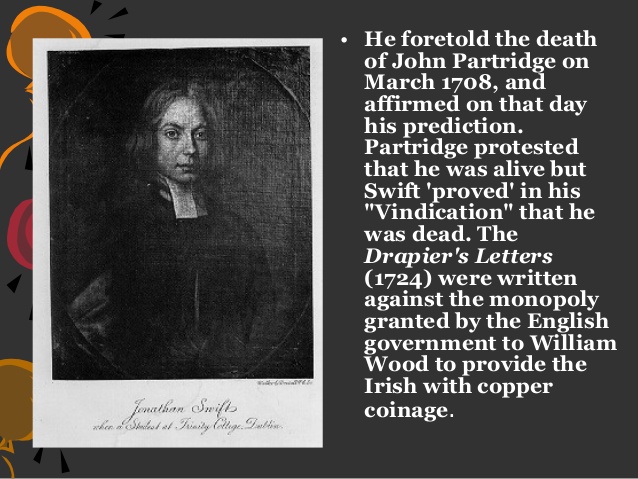Swift is not a misanthrope rather he is a philanthrope. It is the misconception of those who think Swift as a misanthrope. Swift only wants to reform mankind out of their follies and stupidities. He says that the chief end of all his labour is:
“to vex the world rather than divert it”.
Secondly, he declares that:
“I have ever hated all nations, professions, and communities and all his love is towards individuals.”
Thirdly, though Swift does not believe that:
“Man is a rational animal”.
Yet he believes that:
“Man is capable of becoming rational if he makes the necessary efforts.”
But we see that Swift is notorious for being misanthrope. He was subjected to this allegation during his lifetime because the critics, identifying Gulliver with Swift, attributed Gulliver’s blunders to Swift. That Gulliver, in the last voyage, becomes a misanthrope is undeniable and indisputable. Prima facie, it appears that by developing a negative view of mankind, he starts preferring horses to men, but a solid reason of Swift underlies this act of Gulliver.
We observe that in the fourth voyage, Gulliver reaches a country of animals, ruled by animals. There are two categories of animals living there in: ugly and repulsive brutes – Yahoos:
“Yahoos who are unteachable brutes, cunning, gluttonous and disposed to great mischief”.
And comparatively better and nice-looking animals – Houyhnhnms. The moment he enters the country he is confronted with Yahoos and they give him such a nasty and obnoxious treatment that he develops a disliking for them in his heart, which is later converted into hatred owing to their disgusting physical appearance and their filthy and mischievous way of life. But his first meeting with Houyhnhnms, on the other hand, proves a nice experience. And this:
“First impression proves the last impression”.
They secure him against Yahoos, behave properly and gracefully escort him to their abode.
“The behaviour of horses shows him to be animals with an extraordinary power of understanding.”
Naturally, this kind of treatment creates a sort of fondness in Gulliver's heart for Houyhnhnms and their way of life. Upto this time, nothing is objectionable, but his fault begin when he become so enamored of Houyhnhnms that he starts hating man or equating Yahoos with men, he begins to abhor Man. He develops a general hatred against all men. All the subsequent incidents – his hatred against the Captain, against his family, etc. – reflect his misanthropy.
The blunder which Gulliver committed is that, he over-idealizes them because Gulliver is a man who is fed up with Man’s corruption. Therefore, he cannot see corruption in Man. He finds Yahoos in a detestable and abhorrent condition on account of their being a slave of emotions, sensuality and sentimentality. He says:
“Yet I confess I never saw any sensitive being so detestable on all accounts; and the more I came near them, the more hateful they grew, while I stayed in that country.”
Houyhnhnms, in a comparatively better condition, lack that type of corruption that Yahoos have, for Houyhnhnms have no emotion.
“Houyhnhnms are free from lust and greed.”
Naturally, he attributes whole of Man’s corruption to emotions, passions and sentimentality. As a remedy, he starts hating emotions, passion and he falls a victim to pure intellect.
“Here was neither physician to destroy my body, nor lawyer to ruin my fortune, here were no gibers, …, backbiters, …, bawds, …, ravishers, murderers or … poxes.”
So, he mis-idealize Houyhnhnms, due to their pure intellect, somehow establishes a subjective ideal before him i.e. to be a man is to have pure intellect. He thinks:
“The only remedy for doing away with Man’s corruption and pollution is to get rid of all kinds of emotions”.
In the country of Houyhnhnms, when Gulliver has a choice, he adopts for the Houyhnhnms way of life, completely rejecting Yahoos’ path. But when he is compelled to leave the country and to break away form his beloved way of life, and to come to another way of life which he dislikes, it is but natural for him to hate it. In fact, his this ideal is perfectly erroneous. Swift says:
“Idealism leads towards destruction.”
So, it is wrong to detest Man, equating him with Yahoos and it is again inappropriate to set up the ideal of perfect man on the basis of Houyhnhnms’ pure intellect because neither a Houyhnhnms nor a Yahoo is a man, instead, man is a juxtaposition of both intellect and emotions.
“The best code of conduct is Golden Mean which is ‘balance’.”
So he mis-defines Man. However, the fact of the matter remains whether Swift becomes a misanthrope or not, but can we impute Gulliver’s misanthropy to Swift? If we virtually succeed to establish, some identity between Swift and Gulliver, Swift, too, will become a misanthrope.
But according to Swift a man is he who strikes a balance between rationality and sensuality and this balance is not gifted by birth. It has to be acquired. That’s why even Gulliver is subjected to Swift’s satire, for he loses the said balance.
That is the reason we don’t identify Gulliver with Swift and, inspite of Gulliver’s misanthropy, we call Swift a great philanthropist. As he, himself, says:
“I write for the noblest end, to inform and instruct mankind.”






























No comments:
Post a Comment